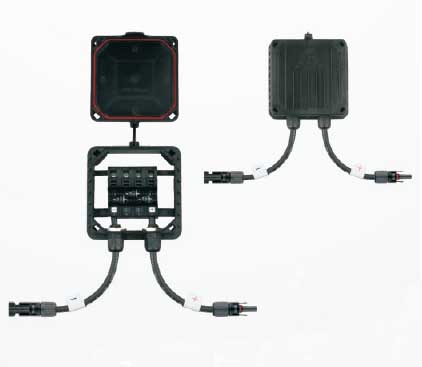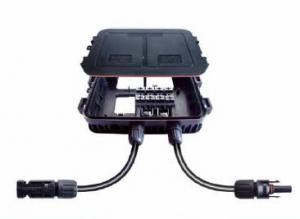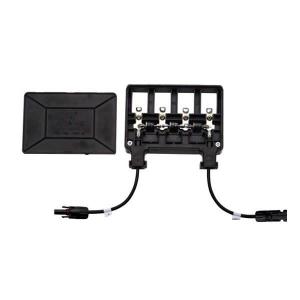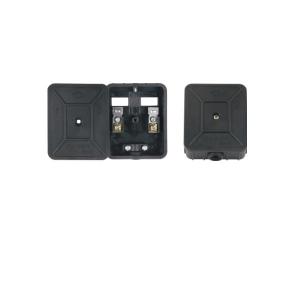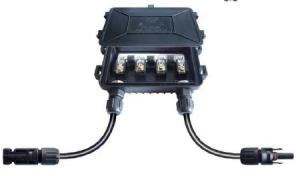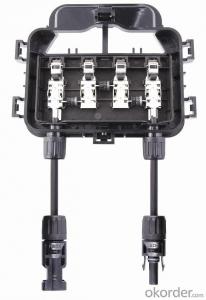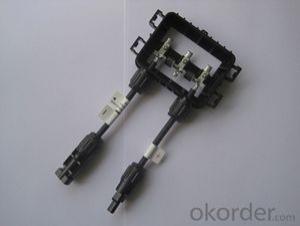Solar Junction box PV-JB001 ST01
- Loading Port:
- China Main Port
- Payment Terms:
- TT OR LC
- Min Order Qty:
- -
- Supply Capability:
- 10000 set/month
OKorder Service Pledge
OKorder Financial Service
You Might Also Like
Solar Junction box,Due to highly robustness,UV-resistance,the touch protection a high grade connection is guaranteed for many years.
Rated voltage 1000 V
Rated current 20A
Contact resistance ≤5mΩ
Dia of pin or socket 3mm /4mm
Protection degree(mated,junction box closed/unmated) IP65/IP2X
Operating temperature -40 C to +85C
Insulation material PPO
Contact material Copper,silver plated
The boxes are supplied with 2 terminals up to 6 terminals.
- Q: Can solar energy systems be used in powering electric fences or security systems?
- Certainly, electric fences or security systems can be powered by solar energy systems. The conversion of sunlight into energy by solar panels enables the generation of electricity, which can be stored in batteries or used directly to operate different devices. This renders solar energy systems a feasible and sustainable alternative for powering electric fences or security systems, particularly in remote or off-grid areas where conventional power sources may not be accessible or dependable. Solar-powered electric fences effectively discourage intruders or confine animals within a specific area, while solar-powered security systems provide continuous surveillance and monitoring without the requirement of a constant electricity supply. Moreover, solar energy systems are eco-friendly and aid in reducing carbon emissions related to traditional power sources, thus becoming an increasingly sought-after and cost-efficient solution for diverse applications, including electric fences and security systems.
- Q: How do solar energy systems affect the carbon footprint?
- Solar energy systems significantly reduce carbon footprint. They generate electricity by harnessing the sun's energy, which is a clean and renewable source. This eliminates the need for fossil fuels, such as coal and natural gas, that release harmful carbon dioxide emissions when burned. By using solar energy, we can minimize greenhouse gas emissions and combat climate change.
- Q: How much space do solar panels take up on a roof?
- The amount of space solar panels take up on a roof depends on various factors, such as the size and number of panels, as well as the layout and orientation of the roof. On average, a typical residential solar panel system requires about 100-400 square feet of roof space. However, it's best to consult with a solar professional to assess your specific roof and determine the optimal size and configuration for your solar panel installation.
- Q: Can solar energy systems be used for powering off-grid wildlife monitoring stations?
- Yes, solar energy systems can be used for powering off-grid wildlife monitoring stations. Solar panels can capture sunlight and convert it into electricity, which can then be stored in batteries for use during nighttime or cloudy conditions. This makes solar energy an ideal and sustainable solution for providing power to remote wildlife monitoring stations that are not connected to the grid.
- Q: Can solar energy systems be used in camping or outdoor activities?
- Certainly, solar energy systems are applicable for camping or outdoor activities. In reality, solar power proves to be an excellent solution for living off-grid or when you are away from conventional power sources. You can employ portable solar panels, also known as solar chargers, to harness the sun's energy and convert it into electricity, thus powering various camping or outdoor devices. Using solar energy systems for camping offers numerous advantages. Firstly, they provide a renewable and sustainable power source, reducing your reliance on fossil fuels or disposable batteries. This not only benefits the environment but also saves you money in the long term. Solar energy systems can charge a wide range of devices, including smartphones, tablets, laptops, cameras, portable speakers, and even small appliances like coolers or lights. This ensures that you can stay connected, capture memories, or enhance your camping experience without worrying about battery life. Portable solar panels are lightweight, compact, and easy to carry, making them perfect for camping or outdoor activities. They can be set up in various ways, such as attaching them to a backpack, placing them on the ground, or mounting them on a tent or RV. Some solar chargers even feature integrated batteries, allowing you to store energy for later use and ensuring a constant power supply, even on cloudy days or at night. It is important to note that the efficiency and power output of solar energy systems may vary depending on factors like weather conditions, panel quality, and the angle at which they are positioned towards the sun. Therefore, it is crucial to select reliable and reputable solar products that suit your specific needs. All in all, solar energy systems offer a fantastic option for camping or outdoor activities, providing a clean, reliable, and sustainable power source. Whether you need to charge your devices, illuminate your campsite, or power small appliances, solar power can greatly enhance your outdoor experience.
- Q: How do solar energy systems impact the quality of indoor air?
- Solar energy systems have a positive impact on indoor air quality. Unlike traditional energy sources, solar power does not release harmful pollutants or greenhouse gases, resulting in cleaner and healthier indoor air. This benefits individuals by reducing the risk of respiratory issues and promoting overall well-being.
- Q: Can solar energy systems be installed in urban areas with limited space?
- Solar energy systems can indeed be installed in urban areas with limited space. Despite the fact that urban areas often have limited rooftop space for solar panel installation, there are several creative solutions that can be used to overcome this challenge. One option is to install solar panels on vertical surfaces like walls or building facades. This approach makes the most of the available space and doesn't require additional land. By utilizing vertical space, solar energy systems can still generate a significant amount of electricity even in densely populated urban areas. Another solution is to implement community solar projects. These projects involve installing solar panels in a centralized location within the urban area, such as a parking lot or vacant lot. The electricity generated by these panels can then be shared among multiple buildings or households, allowing those with limited rooftop space to still benefit from solar energy. Furthermore, advancements in technology have resulted in the development of more efficient and compact solar panels. These panels can generate the same amount of electricity as traditional panels with less surface area, making them more suitable for installation in limited urban spaces. In addition to these solutions, it's important to consider the potential of integrating solar energy systems into existing infrastructure. For instance, solar panels can be installed on top of bus stops, streetlights, or even on the sides of bridges and highways. This allows for the utilization of spaces that would otherwise go unused. In conclusion, although limited space can be a challenge, there are various ways to install solar energy systems in urban areas. With innovative approaches and technological advancements, solar power can be harnessed even in densely populated cities, contributing to a more sustainable and renewable energy future.
- Q: How do solar energy systems affect the structural integrity of a building?
- Solar energy systems can potentially affect the structural integrity of a building, but the impact is generally minimal. The installation of solar panels adds additional weight to the roof, which may require reinforcement in some cases. However, modern solar panels are lightweight and designed to distribute the load evenly, minimizing the strain on the structure. Additionally, proper installation by qualified professionals ensures that the panels are securely mounted and do not compromise the building's integrity. Overall, solar energy systems have a negligible impact on the structural integrity of a building when installed correctly.
- Q: What is the payback period for a solar energy system?
- The payback period for a solar energy system refers to the time it takes to recover the initial investment through energy savings. It typically varies depending on factors such as the cost of the system, government incentives, energy consumption, and local electricity rates. On average, the payback period for a residential solar energy system ranges from 5 to 10 years, while commercial systems may have shorter payback periods due to higher energy consumption.
- Q: Can solar energy systems be used for powering off-grid communities?
- Yes, solar energy systems can be used effectively for powering off-grid communities. Solar panels can generate electricity by converting sunlight into usable energy, making it an ideal solution for areas that lack access to traditional power grids. By installing solar panels and utilizing battery storage systems, off-grid communities can meet their energy needs sustainably and independently. Solar energy is a clean and renewable source, providing a reliable and cost-effective solution for powering off-grid communities.
Send your message to us
Solar Junction box PV-JB001 ST01
- Loading Port:
- China Main Port
- Payment Terms:
- TT OR LC
- Min Order Qty:
- -
- Supply Capability:
- 10000 set/month
OKorder Service Pledge
OKorder Financial Service
Similar products
Hot products
Hot Searches
Related keywords

